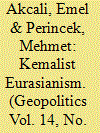|
|
|
Sort Order |
|
|
|
Items / Page
|
|
|
|
|
|
|
| Srl | Item |
| 1 |
ID:
091053


|
|
|
|
|
| Publication |
2009.
|
| Summary/Abstract |
Over the past decade or so, there has been a convergence between the Eurasianist and Kemalist ideologies in Turkey. A number of Kemalist and Socialist intellectual and political actors together with sections of the military have started to articulate Eurasianism (Avrasyac?l?k in Turkish) as a new geopolitical discourse for Turkey and as an alternative to Turkey's pro-Western foreign policy orientation. In this perspective, Eurasianism stands for a political, economic and cultural alliance with 'Eurasian countries', such as Russia, Iran, and Turkic countries in Central Asia, as well as Pakistan, India and China. This article aims to deepen the analyses carried out thus far on this emerging geopolitical discourse. To this end, it contextualises the emergence of the Eurasianism in Turkey within the wider social, political and historical context of which it forms a part, including the framework of asymmetrical political and economic relations that developed between Turkey and its Western allies in the post-Cold War period.
|
|
|
|
|
|
|
|
|
|
|
|
|
|
|
|
| 2 |
ID:
124774


|
|
|
|
|
| Publication |
2013.
|
| Summary/Abstract |
In the wake of the recent Arab revolutions, the European Union (EU) has sought to provide genuine and substantial support to a range of Arab social movements in the region's emerging polities. Yet the EU's recent democracy-promotion efforts represent a puzzle for earlier critical approaches to the relationship between Europe and the Middle East and North Africa (MENA), which argue for the existence of hegemonic patronage linkages. We argue, however, that the EU's attempts at democracy promotion in the MENA region may be understood through a governmentality framework, despite the limitations of such an approach. Specifically, the EU is actively promoting neoliberal policies in the aftermath of the Arab Spring in order to foster a mode of subjectivity that is conducive to the EU's own norms and interests. What we observe are not just innocent attempts at democracy promotion, but a form of politics and economics that seeks to subject the agency on the 'Arab street' to EU standards. We conclude by going over the radical plurality of the Arab street, and show how it was in fact earlier neoliberal reforms by their former regimes that created the conditions of possibility for the recent revolutions in Tunisia and Egypt.
|
|
|
|
|
|
|
|
|
|
|
|
|
|
|
|
|
|
|
|
|